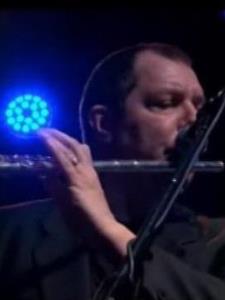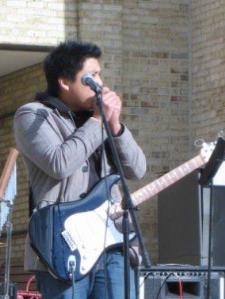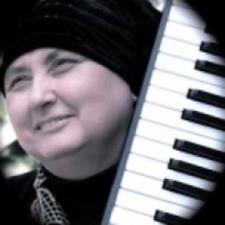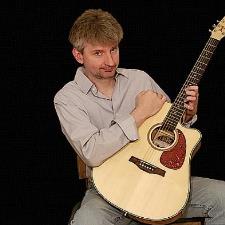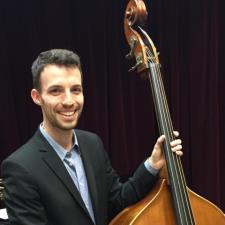327 Answered Questions for the topic music theory
Which scales have a major chord built on second note? Which scales have a minor chord built on the seventh note?
Which base scales (base scale meaning not modes) have a major chord built on the second note? (In which scales is the II chord a major? Is this the proper nomenclature?)
Which scales have a minor...
more
04/26/19
About Relative keys?
C Major key's Sub Dominant relative key is F. But instead, could Fm key also be a Relative key ? So if that works.. From c minor key, could F Major be a relative key also ?
What other modes/scales can i play over a song in the Key of Eb Minor?
I'm wanting to have two pieces of music flow from one to another, first one will be completely original and performed by me the other one is a song that already exists. I've already discovered that...
more
Music Theory Composition (music)
04/23/19
What is the most convoluted standard musical form?
In musical composition, we tend to reuse sections of a piece in patterns that are referred to as "musical forms". Some basic examples of these that I know of are ABA, AABA, ABAB, and the rondo form...
more
How to name more than seven scale tones?
When a scale has more than seven tones, is there any **standard** way to name the scale tones vis-a-vis the major scale tones? For instance, this applies to the two variations of the diminished...
more
Can someone please tell me why there are 5 different patterns to Penatonic scales?
I mean if you can move them, why do you need more than one? All are movable up and down the fretboard? Right? So why does each need 5 patterns and how do you know which one to use? This has really...
more
Are there historical references that show that "diatonic" is a version of 'di-tonic' meaning 'two tonics'?
Wikipedia says that "diatonic" refers to a whole note scale or a scale with seven pitched per octave.
https://en.wikipedia.org/wiki/Diatonic_and_chromatic
But my take is that the major and minor...
more
04/20/19
How do classical composers write music?
I am starting to learn about music theory and today it hit me how do classical composers such as Mozart and Beethoven are able to write music for instruments they don't play, such as (for example...
more
04/19/19
Term for distinguishing dim/perfect/aug intervals from dim/min/maj/aug ones?
There are two types of intervals, distinguished by their possible qualities:
- Unisons, fourths, fifths, and octaves (and their compound variants) may be of perfect or (multiply)...
more
Did Jeff Beck "play the changes" on Goodbye Porkpie Hat?
I have read several different accounts of Charles Mingus' reaction to Jeff Beck's cover of Goodbye Porkpie Hat. One account says he liked it and sent Jeff a note saying this while another says he...
more
04/18/19
Alternative theories of harmony?
Do you know of any alternative (to functional) descriptive theories of harmony or attempts at creating them? By that I mean attempts to explain both functional and non-functional harmonies in a...
more
Dominant Chord in minor key?
In a minor key, e.g. E minor, if you take the dominant triad, it contains the leading note. Is the leading note of the **natural minor** or the major for the dominant triad? So for E minor dominant...
more
04/16/19
what is a "leitmotif" and by whom has it been introduced into music language?
after debating about Paraphrase in music and whether "paraphrasing" could mind something different I came to the question, that someone has been used the first time the German term of "leitmotif"...
more
Guitar book to complement my guitar lessons?
I have recently started guitar lessons. I really love them, but I feel there is something missing. My teacher's approach is "every class, let's learn a new song" but I feel I need some theory, like...
more
04/15/19
Notating Augmented Chords?
When writing an Augmented chord, which inversion of the chord should I use?
The problem came up while I was composing (piano). I came to an augmented chord and couldn't think of which version to...
more
Polyphony vs Monophony?
I am taking a basic music class as an elective and was given a chart to compare monophony and polyphony. The elements within the chart are: Melody, Accompaniment, Harmony, Rhythm of Words, Dynamics...
more
04/14/19
In harmony: key or the flow?
I play ambient music and my approach on creating chord lines is simple, just try to stick on the key and if I want to change the key then make it subtle. But today I tried to create harmony lines...
more
04/14/19
Who did introduce the mediant keys in to music harmony progression?
Which composer(s) introduced as the first time mediant chords and mediant keys in their compositions - or in which period the use of this kind of modulation was coming up?
2-5-1 Jazz progression and modes?
I am classically trained and just started looking into jazz theory. I understand that the 2-5-1 progression is a good place to start. My basic understanding is to play the above progression with...
more
04/13/19
Notating Augmented Chords?
When writing an Augmented chord, which inversion of the chord should I use?
The problem came up while I was composing (piano). I came to an augmented chord and couldn't think of which version to...
more
What are some chord substitutions for a I-IV-V blues progression?
I was watching a video of SRV and one of the things that really stood out was the fact that he seemed to have a different iteration of the I-IV-V turnaround - and made it look/sound effortless. Any...
more
Music Theory Theory
04/11/19
Is the Benny Hill Theme inherently comedic?
The question is in the title. I have tried to answer it for myself, using my knowledge of music theory, and have come up with nothing. I thought it might be the V & I bass pattern, the...
more
04/11/19
How did Rameau's Treatise on Harmony (1722) influence the mass production of musical instruments?
Rameau's Treatise on Harmony (1722) initiated a revolution in music theory but in what ways did that translate into popularizing music ... particularly the mass production of musical instruments?...
more
what are the hand-signs in solfege?
I've searched in SE for solfege and names of altered notes or tones. This point seems to be cleared. But I couldn't find any about hand-signs for solfege. **What are the solfege hand-signs?**
In...
more
Music Theory Calculus
04/09/19
octave frequencies of the tones
What is the frequency of the tone that is one octave lower than 6080 cycles per second?
Still looking for help? Get the right answer, fast.
Ask a question for free
Get a free answer to a quick problem.
Most questions answered within 4 hours.
OR
Find an Online Tutor Now
Choose an expert and meet online. No packages or subscriptions, pay only for the time you need.







